 Abraham Lincoln
If given the truth, the people can be depended upon to meet any national crisis...
Abraham Lincoln
If given the truth, the people can be depended upon to meet any national crisis...
 Guildford news...
for Guildford people, brought to you by Guildford reporters - Guildford's own news service
Guildford news...
for Guildford people, brought to you by Guildford reporters - Guildford's own news service
Insights: Running an Election – Part Three The Result
Published on: 30 Apr, 2024
Updated on: 27 Dec, 2024
With more elections looming across the county, including one for the Police & Crime Commissioner role, Bernard Quoroll recounts his experiences as a local government officer and as a returning officer.
Part Two – The Count
former local authority CEO and returning officer
If an election result is close, a recount might be needed, or even the casting of lots if it is a dead heat.
Sometimes I would also call a recount if it seemed likely that a candidate was going to lose his or her deposit on a close vote. Dealing with candidates and agents was always the most challenging part of a count.
How do you respond to agents in a farming community wanting you to delay a count so that they can go home to milk their cows or where all of them gang up on you to say that they want to get some sleep and continue later in the morning because they are just feeling tired!
The announcement is made, by you on the stage, flanked by the candidates. In parliamentary elections it is made by the King’s representative, with you standing to one side and somewhat confusingly being called the “acting” returning officer, even though you have done all the work. (You will have met him or her earlier and rehearsed it to make sure that it looks and sounds right and that the wrong person does not get declared)! (If you are media savvy, you will also have made sure that the stage is dressed to advertise the logo of the local authority which has organised the event).
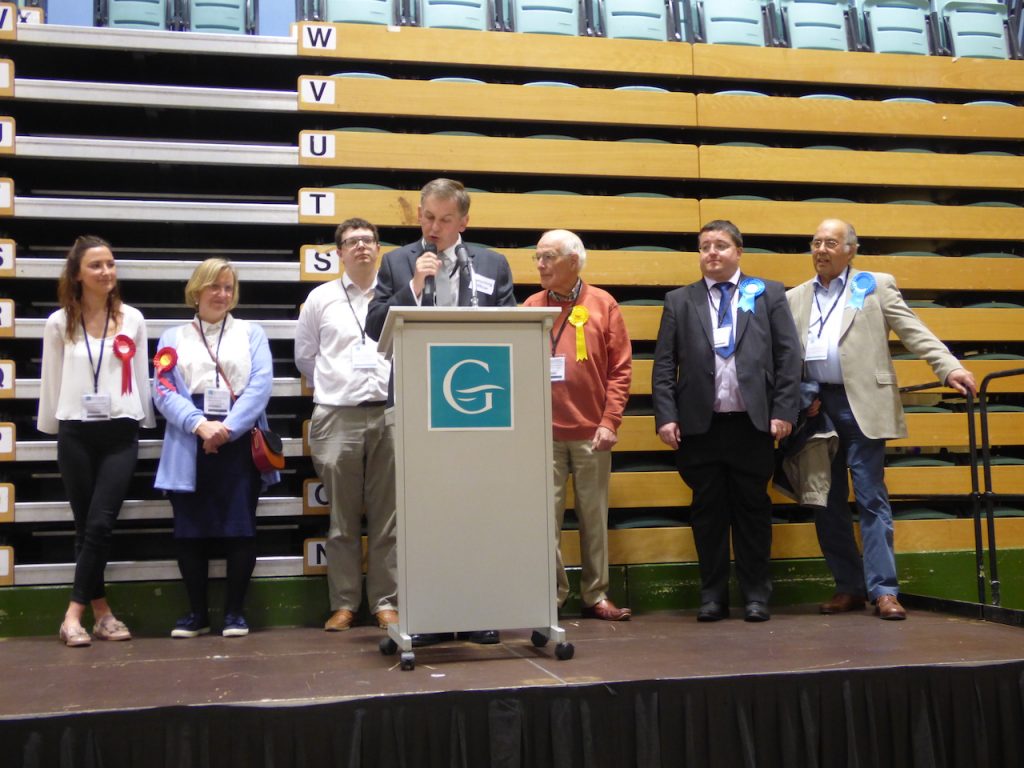
The result for Burpham ward in the 2019 Guildford Borough elections is announced by the returning officer James Whiteman.
After the cheers and boos have subsided, each candidate will have his or her say, some gracefully and some less so, but hopefully all will acknowledge the efforts and impartiality of the election team. All the visitors can then be ushered out into the night while you have a quiet word with the counters, who have worked for so many hours with only modest reward.
Your day has not finished. Any returning officer worth his salt will roll up his or her sleeves with the senior team to start packing things away until a few of them take pity on you and tell you that they no longer need your help.
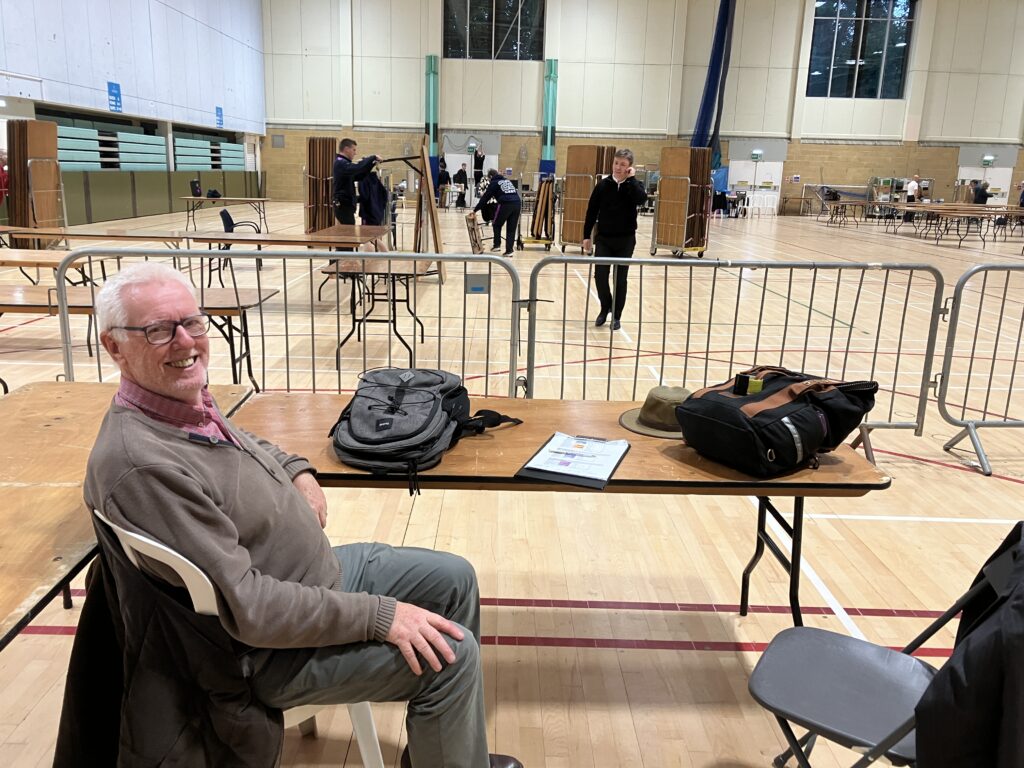
Dragon reporters (here Hugh Coakley in May 2023) are often among the last to leave the Spectrum count centre, always surprised how quickly it is transformed back to a sports hall.
You have been on your feet since 5am the previous day and it is now 23 hours later. If as I did, you have two parliamentary constituencies to count, you will get a couple of hours rest before driving 40 miles to the next constituency and doing it all again. In that place, the incumbent MP was so confident of victory that he did not arrive until halfway through the count.
As I announce that I am about to adjudicate some ballots, he shouts across the hall: “Bernard, with a voice as loud as that, you ought to have become an MP.” In my tiredness, I reply without thinking, “No thanks, I need to work for a living”’. (The member in question was reputed to be the cleverest and laziest Member of Parliament at that time). A hush descends upon the hall as he decides whether or not I am joking and fortunately, he decides that I am.
In that constituency, there is a tradition that the result is declared from the first-floor balcony of a hotel bedroom overlooking a roundabout with passing traffic and a scattering of people below. We all duly march through the bedroom of a surprised but accommodating guest and clamber over the window ledge so that speeches can be made to an indifferent crowd who can barely hear our words for the wind and traffic noise.
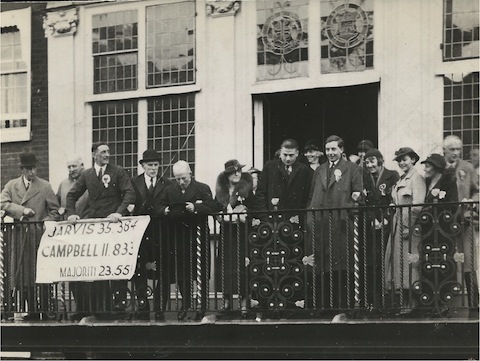
The Guildford result for the 1935 general election was also announced from a balcony in those days, the balcony of the Guildhall. Sir John Jarvis, pictured fifth from left, looking at his hat, was the winner.
And so to bed, at last, 33 hours later – but only for a few hours. (I still wonder whether I should have had the load-bearing capacity of the balcony checked but it had no doubt been that way for hundreds of years….)
The world has moved on since I retired. There is still much talk about digitising elections – a retrograde step in my view. Firstly because no one has yet demonstrated that an online election cannot be hacked.
Secondly, because politicians who put their reputations on the line and go knocking on doors for weeks, deserve to have a memorable experience, rather than just the push of a button, even if or perhaps especially if, they lose.
And thirdly, because a need for convenience and speed cannot in my mind replace what should be a live democratic experience, undertaken by and for humans.
Many of the traditions surrounding election management have gone. Bank tellers, adept at counting paper money no longer race each other to display their skills in the count. In municipal elections, the directors of a council’s management team no longer undertake senior roles at the count to return the elected members that they will be working closely with for the next few years and begin the process of bonding with new members.
Chief executive returning officers no longer get the opportunity to meet newly elected councillors back in the office to tell them to ignore their leader and take every opportunity to get on their feet and “make a fool of themselves” advocating issues they care about.
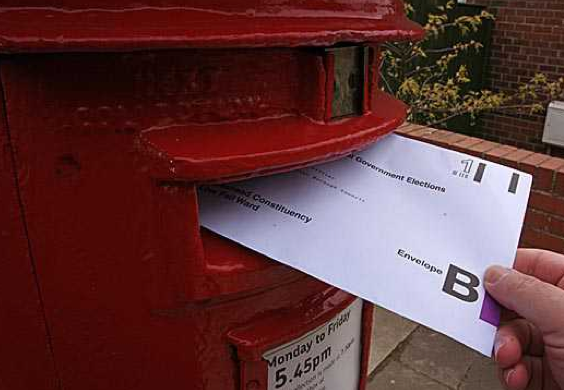 The Blair Government, desperate to maintain the appearance of a healthy system, introduced postal voting on demand in order to get more people to exercise their franchise. It is in my view quite simply a licence to cheat and makes voting no more a significant act than ordering the groceries online.
The Blair Government, desperate to maintain the appearance of a healthy system, introduced postal voting on demand in order to get more people to exercise their franchise. It is in my view quite simply a licence to cheat and makes voting no more a significant act than ordering the groceries online.
I am less concerned about the recent introduction of a requirement to prove identity in order to vote. In doing so we are only falling into line with almost every other democratic nation. Identity can be proved in many different ways and the electorate will quickly get used to it. The legitimate argument that the requirement disenfranchises less advantaged individuals can be overcome with voter education and a little extra effort.
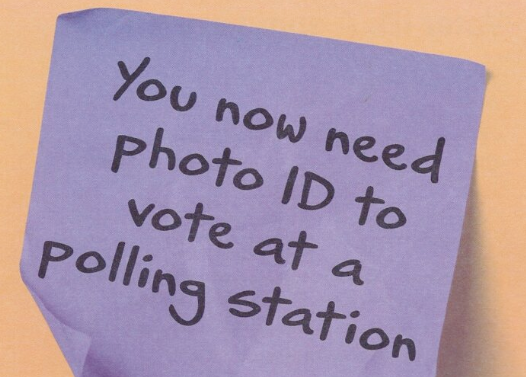 The idea that our system depends on trust is a throwback to earlier halcyon days. So few people proportionally now exercise their right to vote that elections are more likely to be tight, which in turn incentivises cheating, as only a modest number of stolen votes can easily affect the outcome of an election.
The idea that our system depends on trust is a throwback to earlier halcyon days. So few people proportionally now exercise their right to vote that elections are more likely to be tight, which in turn incentivises cheating, as only a modest number of stolen votes can easily affect the outcome of an election.
People did cheat when I was a returning officer, not in large numbers and sometimes in ways less obvious, like young people being sent into care homes to “ help” elderly residents fill on their postal vote forms. Or the local “mister big” in some communities letting it be known how his followers should vote.
When occasionally, people were caught trying to vote twice or impersonating another, the police in those days did not see much point in pursuing them, preferring instead to prioritise feeling the collars of “real criminals”.
And of course, the first-past-the-post voting system operated in this country reduces the urgency for change in that voting numbers are less likely to be close than in proportionately represented elections. But that is not an argument for sticking with our first past the post system which now looks anachronistic and unrepresentative in comparison with so many democracies elsewhere.
Elections in the UK have their moments but in my experience are tamer than I have found when observing elsewhere. That is of course how it should be, in that good administration should be controlled and scandal-free. But we do not have a monopoly of good practice.
We can still learn a lot from other democracies about both good and bad practice. My experience in places like Ukraine, Kosovo, Kazakhstan and Sri Lanka and many other places, has taught me not to be complacent. It has also given me many memorable experiences about holding elections in post conflict countries, including some tense moments.
I was for example arrested briefly in North Macedonia, was tracked closely by security services in several countries and escorted by a UN armoured vehicle in Kosovo as a precaution against land mines. I hope to share some of them in a future article.
Responses to Insights: Running an Election – Part Three The Result
Leave a Comment Cancel reply
Please see our comments policy. All comments are moderated and may take time to appear. Full names, or at least initial and surname, must be given.
Click on cartoon for Dragon story: Public Asked for Views on SCC’s Proposal for Reduced Speed Limits


Recent Articles
- A281 Closure – Further Delay to Re-opening
- Centenary of Wood Street’s First Place of Worship, my Baptism Link with It and the Revd Deedes and his Family
- Care For Guildford Asks: Could You Be One Of Our Volunteers?
- Flashback: There Are Lessons To Learn from the Juneja Case – The Council Must Admit It
- GBC’s Plan For a Thriving Guildford ‘Is Our Promise to Residents’ Says Council Leader
- Highways Bulletin: Campaign for Better Transport
- Check on Forgetful Neighbours During Hot Weather Urges Alzheimer’s Society
- Guildford Museum Works to Encourage Interest in Town’s History
- Missing 15-year-old Girl Located
- What Ash Wants – Village’s Neighbourhood Plan Goes Out for Consultation


Recent Comments
- Caroline Turnbull on Letter: Recreational Rowing Might Be the Answer
- Caroline Freeman on Letter: Recreational Rowing Might Be the Answer
- David Roberts on Letter: Recreational Rowing Might Be the Answer
- Tony Harrision on A281 Closure – Further Delay to Re-opening
- Valerie Thompson on Royal Surrey Patients Complain Changes Won’t Fix Underlying Parking Problem
- John Ferns on GBC’s Plan For a Thriving Guildford ‘Is Our Promise to Residents’ Says Council Leader
Search in Site
Media Gallery
Dragon Interview: Local Artist Leaves Her Mark At One of England’s Most Historic Buildings
January 21, 2023 / No Comment / Read MoreDragon Interview: Lib Dem Planning Chair: ‘Current Policy Doesn’t Work for Local People’
January 19, 2023 / No Comment / Read MoreA3 Tunnel in Guildford ‘Necessary’ for New Homes, Says Guildford’s MP
January 10, 2023 / No Comment / Read More‘Madness’ for London Road Scheme to Go Ahead Against ‘Huge Opposition’, Says SCC Leader
January 6, 2023 / No Comment / Read MoreCouncillor’s Son Starts Campaign for More Consultation on North Street Plan
December 30, 2022 / No Comment / Read MoreCounty Council Climbs Down Over London Road Works – Further ‘Engagement’ Period Announced
December 14, 2022 / No Comment / Read MoreDragon Interview: GBC Reaction to the Government’s Expected Decision to Relax Housing Targets
December 7, 2022 / No Comment / Read MoreHow Can Our Town Centre Businesses Recover? Watch the Shop Front Debate
May 18, 2020 / No Comment / Read More







David Roberts
May 1, 2024 at 5:22 pm
Old satirical cartoons show that, traditionally, British elections were boisterous and rather anarchic folk events. Even fifty years ago, hustings were popular public theatre. Politicians won votes through their spontaneity and witty put-downs when challenged by hecklers. This reassured voters that they could think on their feet, unlike today’s on-message automata. Election day always had a holiday atmosphere; people still got excited, even though the choice was often binary.
In other countries, elections often feel deadly serious and can, literally, be a matter of life and death. At our embassy in Chile in 1997 I made the big mistake of suggesting – just as a bit of fun – a sweepstake on the forthcoming UK general election result. The locally engaged staff were horrified, wondering what my motive could possibly be and what the “right” answer was.
Susan Fox
May 2, 2024 at 2:36 pm
I’ve just returned from voting, very quiet around here most of my neighbours and people I know were blissfully unaware that there was an election on for Police Commissioners knowing that we don’t have local elections.
My guess is the turnout will be very low as opposed to local and general elections when there are queues and traffic problems.
I can only image what a pain it is for the officiating staff when it’s so low key and they are sat in an echoing hall for hours.
Ben Barton
May 3, 2024 at 9:41 am
Running an election is fine but as GBC has moved the polling station at Grace Church (Guildford Park Church) to Onslow Village Hall, there are bound to be questions asked about the politicisation of the process as well as what happens with voters on the day.